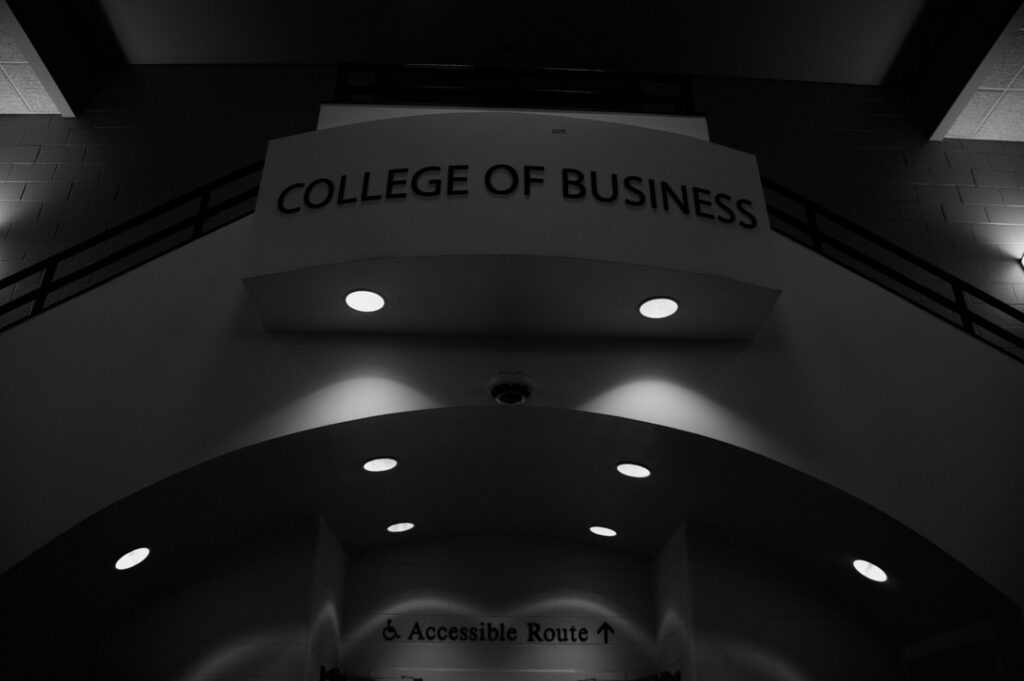UMW should offer a personal finance course to prepare students for financial responsibilities after graduation
3 min read
The College of Business offers classes ranging from management, entrepreneurship and marketing. | Abbey Magnet, The Weekly Ringer
ABBY KNOWLES
Opinion Editor
While sitting in my 9 a.m. Perspectives on Organizations in Society class with Business Professor John Burrow, I sometimes feel out of place. We learn about a mix of things, from management to entrepreneurship, and as a communication and digital studies major with no background in business, terms like “limited liability” and “cooperative business” seem almost like a different language to me.
Coming into this class, I wish I had more of a vocabulary of business and personal finance terms. For people like me outside of the College of Business, we may never fully gain an understanding of these terms unless our parents have the patience to sit us down and teach us. I’ve really enjoyed this class and appreciate all that I’m learning about businesses and money, but had the class not piqued my interest, I would have never learned about these topics that have lifelong importance.
Therefore, UMW should offer a course on personal finance to teach students about important topics relating to financial planning, such as paying taxes, building savings and retirement accounts and renting and buying properties.
“I believe that financial literacy is a major shortcoming of college graduates. Too many times we try to simplify the complexities of developing wealth and financial security and fail to recognize that the basics of managing money are not understood or practiced by people of all ages,” said Burrow. “By providing this understanding through a personal finance course, students will develop the knowledge and skills to effectively understand and manage their finances as well as plan for the future.”
This personal finance course could fulfill general education requirements like Quantitative Reasoning or After Mary Washington. A course like this would make our general education requirements richer and provide undergraduate students with valuable information they’ll need after college.
“Topics for the course might include discussions on how to budget; what is a credit rating (and how do you build it and why you care); short term versus long term financial planning; financial challenges (what to look for); financial opportunities (developing wealth); retirement planning (especially as a student); and investing (risks and opportunities),” Burrow said.
While Virginia high schools require an economics and personal finance credit to graduate, it’s often offered online, and many of us are too young for the information to be applicable when we take the class. I vividly remember my class—and I did learn a lot—but I was also 17 years old at the time, so I didn’t care about rental agreements, mortgages, savings accounts or credit cards. For me, taking that course was just about checking another box required for graduation.
However, four years later, I wish I had a crash course on this information as a 21-year-old getting ready to enter a world where rental agreements, budgeting and repaying loans are a reality instead of just a concept taught in class.
“I had to take personal finance in high school and I didn’t learn any practical skills,” said junior communication and digital studies major Erin Caine. “I think something that actually has us practice how to fill things out could be very helpful.”
Upon graduating, students like myself need to know how to plan for things like student loan repayments and housing costs. Furthermore, students considering grad school should be taught how to weigh the pros and cons of the financial investment that comes with the additional degree. All of this requires a baseline knowledge of personal finance that this class could provide.
“I would like to learn about real world applications and have a hands-on learning experience, like how to do my taxes and how to manage a savings account or how to rent or buy a home,” said junior communication and digital studies and psychology double major Dayton Keffer.
So, why should UMW create a course to teach us all this? The answer is simple: This is the stuff we’ll need to know how to do after our time at Mary Washington comes to an end.










